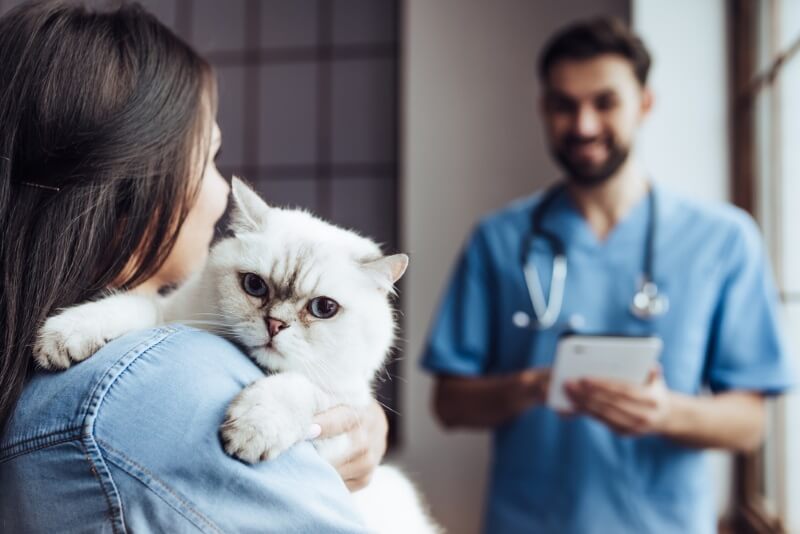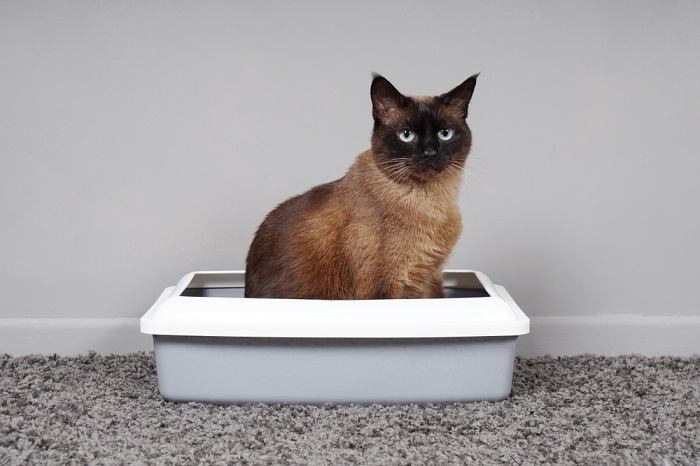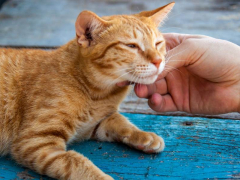
Has this ever happened to you?
You’re scooping out your cat’s litter box when you see something alarming: blood in your cat’s stool. Just what does it mean if you see blood in cat poop? And how worried do you need to be?
Blood in your cat’s stool can vary in appearance. Bright red blood in stool (hematochezia) is fresh and black blood (melena) is older—it appears black because it’s been digested or partially digested by the cat. Black or tarry looking stool is an emergency.
What Causes Blood In Cat Stool?
Blood in cat stool is most often caused by colitis (inflammation of the colon). Although colitis is one of the most common reasons for blood in a cat’s stool, colitis is a symptom rather than a diagnosis.
Colitis is a general term that describes inflammation of the colon, which is part of your cat’s intestinal tract.
Bloody stool can be caused by many different things. Here are some of the most common causes:
- Anal gland (anal sac) infection, impaction or abscess
- Anxiety
- Bacterial infection
- Blood clotting disorder
- Cancer
- Constipation
- Dietary changes
- Dietary indiscretion (eating inappropriate or spoiled food)
- Food allergy/food intolerance
- Inflammatory bowel disease (IBD)
- Intestinal blockage (foreign body)
- Intestinal parasites (worms like roundworms or one-celled organisms like coccidia)
- Kidney disease
- Liver disease
- Medication intolerance
- Megacolon
- Pancreatitis
- Poisoning
- Rectal polyps
- Trauma (hit by car, animal attack)
As you can see, blood in a cat’s stool can have lots of different causes; some are minor, some are more concerning, and some are true emergencies. It’s impossible to know exactly the reason for the blood you are seeing in your cat’s bowel movements without a veterinary exam.
For example, changing cat food may cause blood in stool or having worms can cause blood in stool in cats. Seeking veterinary attention is vital any time you see blood in the stool, whether bright red or dark, black or tarry-looking.
Also Read: 10 Subtle Signs Your Cat May Be Sick
Should I Worry If My Cat’s Poop Has Blood?
Never ignore blood in a cat’s stool.
Blood in cat poop indicates that something is going on with her health. There are no home remedies for blood in cat stool. If you see blood or think you see blood in your cat’s poop, call your veterinarian to make an appointment to have her seen.
Consider The Following Scenarios:
1. You Just See a Small Amount of Blood in Your Cat’s Stool and the Blood Is Bright Red.
If your cat’s stool looks fairly normal and your cat is not acting sick, you can probably wait a day or two for the next available appointment.
Even if your cat seems to be acting fine, at the very least call your vet to have a conversation about what you saw in the poop. Although a normal cat might experience blood in the stool occasionally, it’s still worth investigating.
2. You See Dark Blood (Dark Red, Black or Tarry Looking).
In some instances, blood in cat poop requires more urgent veterinary care. your cat must be seen immediately—your cat may be experiencing internal bleeding and this cannot wait.
3. You See Any Amount of Blood, and Your Cat Is Acting Sick or Has Other Symptoms.
Stool can tell you a lot about cat health. If the blood is bright red and your cat is also experiencing diarrhea or vomiting (or both), if your cat has lots of slimy mucus as well as blood in her stool, if the amount of blood is excessive, if your cat is eliminating outside the litter box, or if your cat is showing other signs that she is feeling sick (cat is hiding, cat is not eating, cat is lethargic), get her to a veterinarian to be checked as quickly as possible.
Don’t wait until morning. This might mean a trip to an emergency animal hospital if it’s after normal business hours or over a weekend or holiday. If possible, bring a fresh sample of your cat’s bloody stool with you to the vet.
Also Read: Best Pet Insurance For Cats
What Will the Vet Do for a Cat With Bloody Stool?

Once you arrive at the hospital, the veterinarian will usually do the following:
- Take a medical history from you, asking about your cat’s health, environment, and lifestyle.
- Conduct a complete physical examination of your cat, feeling her body and looking into her eyes, ears, and mouth.
- Perform a fecal test on your cat’s bloody stool (this is why it’s helpful to bring a stool sample in with you).
Depending on your cat’s other symptoms and the type of blood seen in the stool (bright red or black), the veterinarian might also want to:
- Draw blood for blood work, such as a complete blood count (CBC).
- Collect urine for analysis.
- Take X-rays or perform other diagnostic tests like an ultrasound.
- Recommend exploratory surgery or endoscopy.
If you end up going to an emergency animal hospital, your cat may be transferred to your regular veterinary clinic for further care in the morning.
Treatment for blood in cat stool is highly dependent on the cause of the bleeding. Once your veterinarian is able to pinpoint the source of the blood in your cat’s stool, he or she will be able to identify an appropriate treatment. Your cat may require fluids, medications, special food, or other care.
Blood in Cat Poop but Acting Normal—Do Not Ignore It

If you see blood in your cat’s poop, don’t panic, but do have your cat checked by a veterinarian as quickly as possible. With cats especially, it’s never a good idea to delay seeking veterinary care.
Cats are evolutionary programmed to hide their illnesses. In the wild, a sick or injured cat could become a target for a larger predator.
This is the reason cats often hide their pain and discomfort. Sick cats will often act completely fine—until they’re not. Signs of illness, like loss of appetite and weight loss, can be difficult to notice, especially in older cats.
By the time you realize something is wrong with your cat, the issue may become more complicated. When this happens, the treatment may be more invasive and more costly.
Delaying treatment can lead to worse outcomes for the cat. It’s always better to be safe than sorry, and bring your cat in for an exam if you see blood in your cat’s stool.
Disclaimer: This article is for informational purposes only and is not intended to be a substitute for professional veterinary care. Always talk to your veterinarian about questions you may have regarding your pet’s medical condition. Do not delay seeking professional veterinary advice because of something read on the internet.







